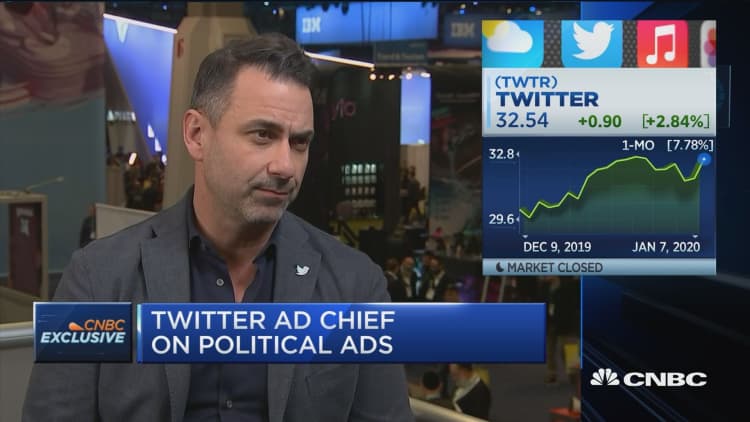
Twitter is taking steps to ensure its decision to ban political ads does not create further information silos, executive Matt Derella told CNBC on Tuesday.
"We want to make sure we don't create filter bubbles with this powerful ad system we have," Derella, Twitter's vice president of revenue and content partnerships, said on "Closing Bell."
Twitter plans to accomplish that by still allowing "issue-based ads, with certain limitations," Derella said.
"As long as those ads aren't focused on a particular legislation or a candidate, we allow organizations that are nonprofits to actually advertise," Derella said.
Twitter CEO Jack Dorsey has previously weighed in on the social media platform's role in creating filter bubbles, in which people are exposed primarily to information that confirms their own beliefs, conceding it contributes to them.
"I think that's wrong of us. We need to fix it," he said in October 2018.
At the time, Dorsey said a potential solution to that problem would be to offer users the ability to see tweets from both sides on a topic, instead of simply following a user who presents just one viewpoint.
On Tuesday, Derella said Twitter is also working on a feature to make it as easy to follow a topic as it is to follow an individual account.
Dorsey announced in October that the social media company would ban political ads from appearing on its platform. The move put Twitter in direct opposition to Facebook, which has faced criticism over its policy to forgo fact-checking on political ads on its platforms.
Under Twitter's new policy, a global ban is in place on the promotion of political content and ads of any type from political figures such as candidates, political parties and government officials.
It will also govern what it calls "cause-based" ads, which will be restricted in terms of targeted advertising and require a certification process to run.
Twitter's decision to go without political ads has been criticized for various reasons. Some argue the policy remains somewhat murky and will help incumbent candidates over challengers.
While political ad revenue makes up a small fraction of Twitter's revenue, others still believe it is a mistake to forgo it in a pivotal election year.
Derella doubled down on the decision, arguing it is based on principles and not money considerations.
He also dismissed concerns about enforcement of the policy. He said Twitter is constantly tweaking its enforcement practices, which includes machine learning and other algorithms, but "we feel like we're in a very good position."
"We feel like we made the right decision for us and for our customers," he said.
Shares of Twitter closed up 2.8% on Tuesday at $32.54. They are down about 29% from a 52-week high of $45.86 on Sept. 9.
— CNBC's Lauren Feiner and Megan Graham contributed to this report.


